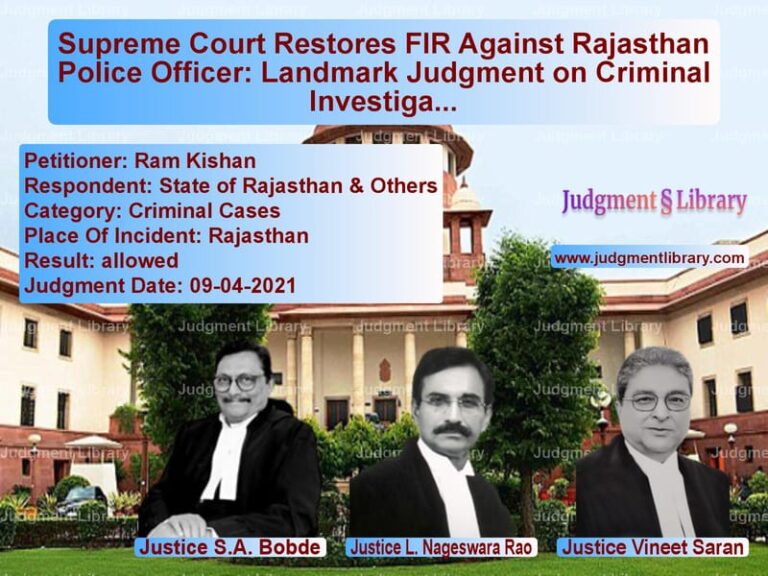Supreme Court Acquits Accused in Murder Case Due to Doubts on Witness Credibility
In a significant judgment, the Supreme Court of India acquitted Aslam alias Imran in a murder case, citing serious doubts about the credibility of prosecution witnesses and inconsistencies in their testimonies. The case, Aslam alias Imran vs The State of Madhya Pradesh, involved the alleged murder of Zahid Khan alias Guddu in 1994. Here’s a detailed analysis of the case, the arguments presented, and the court’s ruling.
Background of the Case
On August 22, 1994, Zahid Khan alias Guddu was fatally stabbed in Naya Mohalla, Jabalpur. The prosecution alleged that Aslam alias Imran attacked Guddu with a butcher knife during a quarrel, leading to his death. The trial court and the High Court convicted Aslam under Section 302 of the Indian Penal Code (IPC) and sentenced him to life imprisonment. The Supreme Court, however, overturned these convictions, highlighting glaring inconsistencies in the prosecution’s case.
Key Arguments
Appellant’s Arguments (Aslam alias Imran)
- Mr. Sanjay R. Hegde, learned Senior Counsel for the appellant, argued that the prosecution witnesses were unreliable and their testimonies were contradictory.
- He pointed out that the witnesses failed to report the incident to the police immediately, despite the police station being nearby, which cast doubt on their credibility.
- He also contended that even if the incident occurred during a quarrel, it did not prove premeditated murder, and the appellant should benefit from Exception 4 of Section 300 of the IPC, which covers culpable homicide not amounting to murder.
Respondent’s Arguments (State of Madhya Pradesh)
- Ms. Mrinal Gopal Elker, learned counsel for the State, defended the convictions, asserting that the eyewitness testimonies were consistent and proved the appellant’s guilt beyond reasonable doubt.
- She argued that both the trial court and the High Court had correctly appreciated the evidence and found the appellant guilty of murder.
Supreme Court’s Observations and Ruling
On Witness Credibility
The Supreme Court scrutinized the testimonies of key prosecution witnesses, including Shahid Khan (PW-1), Rassu (PW-2), Asif Khan (PW-3), and Saiyad Wahid Ali (PW-4). The bench noted:
“The witnesses who were carrying the deceased Guddu to the hospital not having bloodstains on their clothes; the witnesses not informing either the Police Station or the police constable who was standing at a distance of about 50 steps from the place of incident; the contradictions in the evidence of witnesses with regard to presence of each other at the place of incident; the witnesses not informing the cause of death of the deceased Guddu in the MLC papers, though according to them they were aware about the person who had inflicted the injury on the deceased; and recording of the statement of the witnesses after a long gap after the date of incident when the said witnesses were very much available.”
The court emphasized that these inconsistencies raised serious doubts about the prosecution’s case.
On Previous Enmity
The court acknowledged that the deceased and the appellant had a history of enmity, which could have led to false implications. The bench observed:
“It is a settled law that enmity is a double-edged weapon. On one hand, it provides motive, on the other hand it also does not rule out the possibility of false implication. From the nature of the evidence placed on record by the prosecution, the possibility of the present appellant being falsely implicated on account of previous enmity cannot be ruled out.”
Final Decision
The Supreme Court acquitted the appellant, granting him the benefit of doubt. The bench concluded:
“In our opinion, therefore, the appellant is entitled to benefit of doubt.”
The court quashed the judgments of the trial court and the High Court, discharged the appellant’s bail bonds, and set him free.
Conclusion
This judgment underscores the importance of credible and consistent witness testimonies in criminal cases. The Supreme Court’s decision highlights that convictions cannot stand on shaky evidence, especially when there are contradictions and delays in reporting. The ruling reaffirms the principle of “benefit of doubt” in criminal jurisprudence, ensuring justice is not compromised by unreliable testimonies.
Petitioner Name: Aslam alias Imran.Respondent Name: The State of Madhya Pradesh.Judgment By: Justice B.R. Gavai, Justice Augustine George Masih.Place Of Incident: Naya Mohalla, Jabalpur.Judgment Date: 26-03-2025.
Don’t miss out on the full details! Download the complete judgment in PDF format below and gain valuable insights instantly!
Download Judgment: aslam-alias-imran-vs-the-state-of-madhya-supreme-court-of-india-judgment-dated-26-03-2025.pdf
Directly Download Judgment: Directly download this Judgment
See all petitions in Murder Cases
See all petitions in Bail and Anticipatory Bail
See all petitions in Attempt to Murder Cases
See all petitions in Judgment by B R Gavai
See all petitions in Judgment by Augustine George Masih
See all petitions in allowed
See all petitions in Quashed
See all petitions in supreme court of India judgments March 2025
See all petitions in 2025 judgments
See all posts in Criminal Cases Category
See all allowed petitions in Criminal Cases Category
See all Dismissed petitions in Criminal Cases Category
See all partially allowed petitions in Criminal Cases Category







